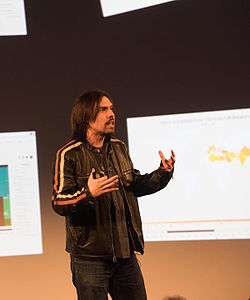Cesar A. Hidalgo
| Cesar A. Hidalgo | |
|---|---|

Cesar Hidalgo in 2014
|
|
| Born | Cesar Augusto Hidalgo Ramaciotti December 22, 1979 Santiago, Chile |
| Nationality | Chilean |
| Fields | Complexity economics, Complex Systems, Network Science, Data Visualization |
| Institutions | MIT |
| Alma mater |
Universidad Catolica de Chile, Notre Dame |
| Thesis | Three empirical studies on the aggregate dynamics of humanly driven complex systems (2008) |
| Doctoral advisor | Albert-Laszlo Barabasi |
| Known for | The Atlas of Economic Complexity, ‘’The Product Space’’, Economic complexity index’’,Why Information Grows' |
| Notable awards | Bicentennial Medal from the Chilean Congress (2012) |
|
Website chidalgo |
|
César A. Hidalgo (born December 22, 1979) is a Chilean statistical physicist, writer, and data visualization designer. He is an Associate Professor of Media Arts and Sciences at MIT and the director of the Macro Connections group at The MIT Media Lab. Hidalgo is the author of Why Information Grows, and co-author of The Atlas of Economic Complexity. Hidalgo is known for pioneering the field of Economic Complexity and for the creation of several popular Data Visualization Engines, such as The Observatory of Economic Complexity, DataViva, Pantheon, Immersion, and DataUSA. He has received the Bicentennial Medal of Science from the Chilean Congress and was selected as a World Economic Forum young global leader. Wired Magazine UK also named him as one of 50 people who could change the world in 2012.
Hidalgo was born in Santiago de Chile in 1979 to Cesar E. Hidalgo and Nuria Ramaciotti. His father was a publicist and journalist and his mother an accountant. He has two siblings Caterina and Nuria.
Hidalgo attended The Grange School until the age of fourteen, but completed his High School Education at Santiago’s The British High School. From 1998 to 2003 he studied Physics at Universidad Catolica de Chile and from 2004 to 2008 he obtained a PhD in Physics from The University of Notre Dame. His PhD advisor was Albert-Laszlo Barabasi.
In 2010 Hidalgo joined The MIT Media Lab as an Assistant Professor and was promoted to Associate Professor in 2014. He directs the Macro Connections group at The MIT Media Lab.
Starting in 2006 Hidalgo began using networks to study the process of economic development. His main contributions include The Product Space, which is a network that can be used to predict a country’s future patterns of diversification, and the economic complexity index, a formula that can be used to estimate the computational capacity of economies and that is highly predictive of future economic growth. Hidalgo’s work in Economic Complexity has been covered by important media outlets like The New York Times, The Economist, and The Financial Times.
...
Wikipedia
